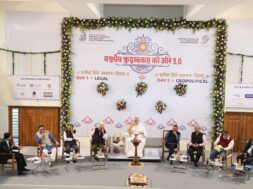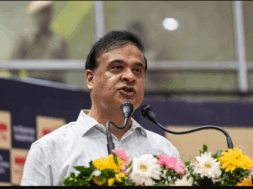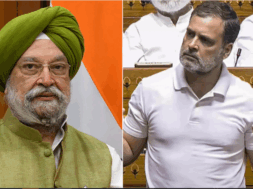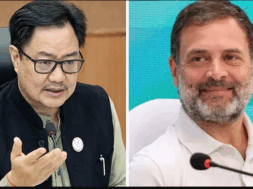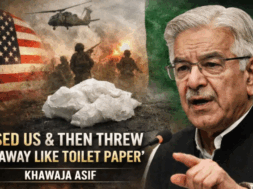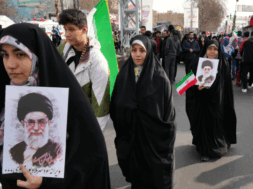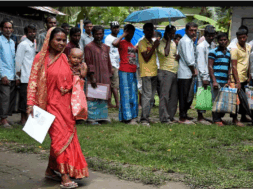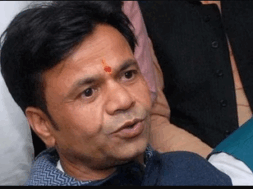
India had internalised and demonstrated limited temporal sovereignty long before the West promoted it
Ahmedabad got a unique opportunity to witness the confluence of spirituality, legality and geopolitics at the Vasudhaiva Kutumbakam ki Oar 3.0 conclave. Jyot India (an NGO and apolitical organisation) organised the event in partnership with Gitarth Ganga as a Research Partner; Vivekananda International Foundation, India Foundation and Wadia Ghandy & Co. as Knowledge Partners, Maharashtra National Law University Mumbai and Nirma University as Education Partners; National Institute of Mass Communication & Journalism as a Media Education Partner; Grand Academic Portal, BMK Foundation and Geostrata as Support Partners and Pravarsh Group of companies as a Shubhecchak. This conclave series is being held under the aegis of 79th Spiritual Sovereign His Holiness Jainacharya Yugbhushansuriji. On day 1, the legal session was on the topics of Sovereignty, Basic Structure Doctrine and Secularism.
The legal theme holds relevance as this year saw various constitutional milestones: 75 years of the Indian Constitution, 51 years of the basic structure doctrine and 30 years of the S.R. Bommai Judgement on secularism. This year also saw the 2550th Nirvana Kalyanak of Tirthankar Shri Mahavir Swami. The aegis of 79th successor His Holiness Spiritual Sovereign Jainacharya Yugbhushansuriji added a different dimension to the discussion. These milestones led the discussion to revisit their relevance in the current scenario, considering evolving realities and comparing these concepts with ancient Indian ones.
The theme was discussed and deliberated under the holy aegis of His Holiness along with the following panellists:
- Shri Percival Billimoria – Senior Advocate
- Shri Suresh Prabhu – Former Union Minister of India
- Dr Aniruddha Rajput – Barrister & Consultant, Withers LLP In London
- Shri C. A. Sundaram – Senior Advocate, Supreme Court of India
- Shri Devadatt Kamat – Senior Advocate, Supreme Court of India
- Shri Vikramjit Banerjee – Additional Solicitor General of India, Supreme Court of India
- Justice M. R. Shah – Former Judge, Supreme Court of India
- Shri Devang Nanavati – Senior Advocate, Gujarat High Court
- Justice Mohit Shah – Former Chief Justice, Bombay High Court
- Mr Dhawal Mehta – Partner, Wadia Ghandy & Co
- Jay Kansara – Partner, Wadia Ghandy & Co
In agreement with Spiritual Sovereign H. H. Jainacharya Yugbhushansuriji, Shri C. Aryama Sundaram elaborated that India imbibed and showcased limited temporal sovereignty much before the West began to propagate it. He added that the Basic Structure Doctrine is nothing but super sovereign to the Constitution as it limits amendments to it to limit the power of the ruler.
Dr Aniruddha Rajput deliberated on the fundamental concept of Statehood. He differentiated between the definitions of the West and East for Statehood. The West takes an exclusionary stance, considering what they are not and, therefore, defining what the State is. This is in perfect contradiction to the Oriental, specifically Indian philosophy of Vasidhaiva Kutumbakam, meaning the world is one family, which is inherently inclusive. He added that the concept of ‘temporal sovereignty’ and rise of ‘nation-states’ developed only after the Westphalia Treaty, whereas Kautilya’s Saptanga Theory much earlier defined the concept of a State and far more effectively with a deeply inclusive perspective.
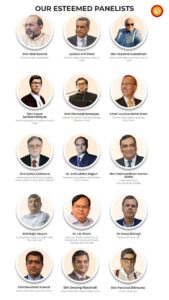
Shri. Devdatta Kamat, awestruck by guruji’s knowledge, deeply resonated with the philosophy of Niti, Nyaya and Sabhyata from Indian scriptures and stated that it closely connects with the modern Basic Structure Doctrine in order to limit internal sovereignty.
Justice Mohit Shah shared that, absolute sovereignty is never in the interest of the country or the people.
His Holiness said, “The three legal concepts of Sovereignty, Basic Structure Doctrine and Secularism within the theme seem disconnected but they are synergistically connected and which in sync would evolve into an ideal system of governance.” To emphasise he said “The sovereignty, territorial or extra-territorial, cannot be absolute but limited by moral values. One of the moral limitations on state sovereignty is secularism which as prescribed in ancient Indian system is non-interference, at least equal and at par treatment of all religions and facilitate them”.
His Holiness further indicated the observation of Justice Mathew in the Keshavananda Bharati Judgement wherein he points out the declaration in the Preamble of the Constitution of India “We the People… enact and adopt this constitution” stating that it is not a fact. His Holiness questioned the source of power of the constituent assembly particularly in context of regulating religion. C A Sundaram spontaneously responded in agreement, “Nothing comes out of nothing!”
The event ended with a joint declaration as the partners and panel converged on specific ideas as outcome of deliberation. The declaration is titled as Gitarth Ganga declaration.
The conclave also had an exhibition titled Arya Parampara: Concept of Sovereignty which had exhibits on the theme. It justified how absoluteness in western temporal and spiritual sovereignty has its impact on modern day turmoil. The exhibition also presented that how today globally and even in India secularism is undefined and due to these various shades of secularism have evolved in different countries. The exhibition even had electrically concept of basic structure doctrine.
The event was attended by around 400 esteemed invites from Ahmedabad and from various states of India and abroad. The audience were selected qualified intellectuals, lawyers, senior advocates and students of law schools.
Day 2 of conclave on Sunday will deliberate on geopolitical issues with many experts as panellists.
The theme for geopolitical session is global trust, multipolarity and role of Vishwabandhu Bharat.
